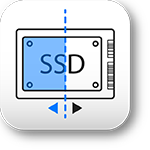QSAL
QNAP’s patented technology that prevents simultaneous multi-SSD failures
The ZFS-based QuTS hero operating system supports QNAP’s patented QSAL (QNAP SSD Antiwear Leveling) algorithm that enhances data protection by preventing multiple SSDs from malfunctioning at the same time in an SSD RAID.
Compared with hard drives, solid-state drives (SSD) are more resistant to impact and vibrations, and their storage performance continues to improve with the advancement of interface technology. SSDs usage continues to grow, and many professional users and business organizations are extensively utilizing them. Therefore, it is vital to understand SSD lifespans and to prevent SSD data corruption.
Challenges of using SSDs. Why & How?
QSAL algorithm prevents simultaneous failure of multiple SSDs
While SSD lifespan is determined by a finite number of writes, it is highly possible that several SSDs in the same RAID reach their end-of-life at the same time, causing a RAID crash with data loss.
QNAP’s patented QSAL algorithm regularly detects the lifespan and durability of SSD RAID. When SSD lifespan drops below 50%, QSAL will dynamically distribute the over-provisioning space and make data be concentrated and densely written into one SSD, accelerating its wear and tear. This helps users to replace the SSD in a timely manner.
QSAL algorithm helps guarantee each SSD has enough time to rebuild RAID before it reaches end of life. This can effectively prevent simultaneous multi-SSD failures and improves the reliability of the entire system.
- QSAL can be activated at any time and is compatible with SSD Parity RAID that has not been configured before.
- It is recommended to enable QSAL before the SSD lifespan reaches 50% to prevent the risk of SSD RAID damage due to insufficient rebuild time.
- QSAL is enabled by default for SSD RAID 5, 6, 50, 60, TP (Triple Parity).
Benefits of QSAL
Automatic RAID disk replacement with spares before potential failure
When disk failure occurs, the RAID enters degraded mode. Rebuilding a RAID can take a long time (from hours even to weeks) which risks further data loss, and system performance is also affected.
Automatic RAID disk replacement with spares (supported from QTS 5.1 / QuTS hero 5.1) automatically moves data from the affected disk in a RAID group to a spare disk, before the data on the affected disk is completely corrupted. Without needing to wait for RAID rebuild, system reliability is greatly improved.

Enable better SSD performance and higher endurance with software-defined SSD Extra Over-provisioning










